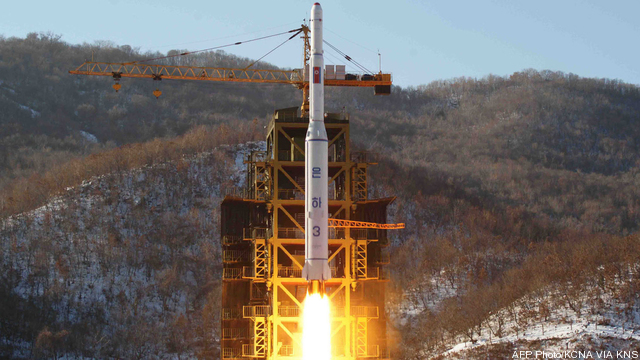US Doesn’t Know If China Helped North Korean Space Launch; Air Force To Boost Cyber Warrior Ranks
Posted on
 WASHINGTON: North Korea’s recent successful launch of a satellite into orbit raises “lots of concerns for lots of reasons,” and means that the secretive state now possesses the capability of an Intercontinental Ballistic Missile, the head of Air Force Space Command, Gen. William Shelton said this morning.
WASHINGTON: North Korea’s recent successful launch of a satellite into orbit raises “lots of concerns for lots of reasons,” and means that the secretive state now possesses the capability of an Intercontinental Ballistic Missile, the head of Air Force Space Command, Gen. William Shelton said this morning.
The ability to sling a warhead across continents is especially worrying in this case since North Korea appears to have successfully tested nuclear weapons. A new nuclear test may be in the works by Sunday, according to South Korean news reports.
North Korea not only launched a rocket successfully but placed a satellite atop it into orbit, something only a handful of countries possess the technology to do.
North Korea launched a rocket on Dec. 12, eliciting strong condemnation from both the US and the UN, with the White House calling it a “highly provocative act that threatens regional security.” Shelton’s comments about North Korea having an ICBM capability provides more texture to the American concerns and makes clear just why the US and virtually everyone within a few thousand miles of North Korea condemned the launch.
China just said after the launch that it was “concerned” but reminded the world that North Korea “is entitled to peaceful use of the outer space, which is subject to relevant U.N. Security Council resolutions.” So there.
There have long been suspicions that China, North Korea’s main friend in the world, must be helping them with space technology and knowledge so I asked Gen. Shelton if North Korea could have launched the rocket without help from China. His answer should send chills down the spines of most national security observers.
Looking a bit chastened, Shelton said: “I don’t know that. I really don’t.” He noted that the north has been working to launch a rocket for some time, but he admitted that, because it is “one of the most opaque” states the U.S. just doesn’t have detailed knowledge of what is happening there. He also said he didn’t know if Iran had helped the north.
Moving to the cyber world, which Shelton largely oversees for the Air Force. he said the service plans to begin adding 1,000 cyber warriors — most of them civilians — to the current force of 6,000 in 2014. The new people will be added over two years. “We think that will be part of the FY14 direction we will get,” Shelton said.
In discussing just what these cyber warriors would do, Shelton peeled back curtain just a little bit.
He danced around the question of cyber weapons but made clear that much cyber action involves Title 50 activities — intelligence.
In fact, the general said networks have become “darn near a substitute for human intelligence activity. There are things you can get to from a computer network that in the past had to be done through human sources. Now you can get it from networks.”
Shelton’s best line of the morning was uttered about cyber: “I call it the Wild West because you can be anywhere and do anything and be effective. All you need is an Internet connection, a laptop and the right skills and you can do anything.”
Subscribe to our newsletter
Promotions, new products and sales. Directly to your inbox.
